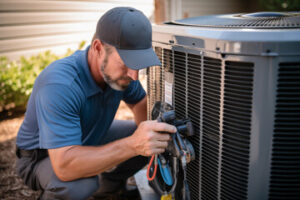Keeping your air conditioning system in good working order helps ensure comfortable home comfort. Timely AC repair and maintenance reduce energy waste.

If you need to recharge your system’s refrigerant, an expert technician will first check that there isn’t a leak. They will also clean the aluminum fins on the evaporator coil and drain channels. Contact Air Conditioning Repair Henderson NV for professional help.
Capacitors are electrical devices that store energy like a small reserve tank, providing a burst of power at a moment’s notice. These are particularly useful in electronic devices that require a high burst of energy to start or operate, such as cameras or flashes. They also provide a crucial role in electronic circuits by smoothing out voltage changes, so that signals can be transmitted properly without being interrupted or disrupted.
A capacitor is essentially two parallel plates of metal, separated by an insulating material known as dielectric. The size and shape of the plates and the dielectric material will determine how much energy a capacitor can hold. The capacitance of a capacitor is measured in farads (F) and is directly proportional to the surface area, A, of the smaller plate and inversely proportional to the distance or separation, d. The higher the capacity of a capacitor, the larger the plates and the less their separation.
Another factor that influences the capacitance of a capacitor is its dielectric constant, k, which refers to the ratio of the permittivity of the plate and dielectric materials to the dielectric constant of air. A lower dielectric constant means a more insulating material, while a higher one indicates a more conductive material.
As electricity flows into a capacitor, it charges the electrons on the plates and creates an electrostatic field between them. This field can repel or attract electrons depending on the direction of the current. As the capacitor continues to charge, the field strength increases. The strength of the field reaches a maximum at the point where the potential difference between the plates is equal to the source voltage. The capacitor is then said to be fully charged. The rate at which the plates charge and discharge is known as its charging current. This current slowly decreases to zero as the capacitor discharges.
Contactors
The contactor is like a switch that provides power to motors within the air conditioning system. It is located in the outdoor condenser unit and is responsible for turning the compressor and fan motors on and off. A common problem that affects the contactor is a chattering sound. This noise is an indication that the contactor isn’t working correctly and needs to be replaced.
Chattering noises from a bad AC contactor can be very distracting. They can be heard as a rattling noise or as a buzzing sound that is louder during startup. A damaged contactor can also cause the compressor to run continuously, causing damage to other components. These issues are easy to spot and should be repaired immediately by a professional.
An AC contactor that is stuck in one position or cannot close completely can stop the fans and compressor from running, which will result in no cool air. It can also make the AC run continuously, increasing energy bills. This isn’t a serious issue, but it is important to get the problem fixed before the problem worsens.
There are many factors that can cause a contactor to fail, including contamination and excessive heat. Dirt, dust, and other contaminants can build up on the contacts, which prevents them from making a good connection. This can lead to electrical arcing, which may melt the contactor’s coil. A melted contactor can also leave behind a burnt smell and charred casing.
To fix a faulty AC contactor, you must first disconnect any power from the unit. Then remove the side cover from the condenser unit. Once you have done this, look for a black rectangle positioned vertically with multiple-colored wires connected to it. The wires are connected to the contactor’s coil and auxiliary contacts. You can use a multimeter to check the current flow through the auxiliary contacts by measuring the electrical resistance between them.
Be sure to take pictures of the contactor before removing it. This will help you remember how to reconnect the wires later on. Also, remember that capacitors store electricity, so handling them can be dangerous. If you are not familiar with electrical work, it’s best to consult an AC repair service Chantilly.
Evaporator Coil
The evaporator coil is one of the essential components of your AC system. It is located inside your home’s indoor unit and performs the most crucial function of all – cooling the air in your home. The evaporator coil is a set of copper tubes that house a super cold chemical refrigerant. As warm air passes over the coils, the refrigerant absorbs heat from it, causing it to evaporate and cool the air that circulates back into your home.
Because of this vital function, it’s important that you keep an eye on the health of your evaporator coil. Clogged or frozen coils can lead to a variety of problems that impact your AC’s ability to cool your home properly. To avoid these issues, it’s important to know what to look for and understand how your evaporator coil works so that you can identify any issues in time.
Some of the most common signs that your evaporator coil is in need of repair include warm air coming from your vents, high electricity bills, and general poor cooling performance. If you notice any of these symptoms, it’s essential to call an experienced professional to diagnose the problem and perform the necessary repairs.
Another issue that can affect your evaporator coil is dirt build-up. This can occur due to a lack of cleaning and maintenance. Leaving dust and debris to build up over time can hinder airflow within your home, causing the evaporator coil to become clogged.
A clogged evaporator coil can also prevent the refrigerant from being able to absorb heat, which will ultimately lead to low energy efficiency and higher electricity bills. It is essential to clean the coils regularly and to have regular air conditioning services carried out to keep them in good condition.
Finally, a frozen evaporator coil can be extremely dangerous for your health. This can be caused by a build-up of dirt and debris that has prevented the coil from absorbing heat or by a build-up of frost, which will cause the airflow to become restricted. The best way to deal with this is to contact a professional who can remove the ice and clean the coil.
Blower Motor
Though it may not be in everyone’s wheelhouse, understanding your HVAC system’s blower motor helps you troubleshoot problems and determine when to repair or replace it. This component is the heart of your heating and cooling, pushing conditioned air through your home’s ductwork and vents. However, it’s also a mechanical and electrical component that can experience many common faults.
The most obvious sign that the blower motor is in trouble is weak airflow from your vents. This can be caused by debris buildup, a bad capacitor, or the blower motor itself being past its functional life. An experienced HVAC professional can evaluate the situation and determine if it’s due to the blower motor itself or another issue, such as dirty or leaky ducts.
Blower motors typically have a lifespan of 10-20 years. This depends on how frequently the system runs, dust and humidity levels, and the quality of the blower motor itself. As a result, it’s important to keep an eye on any potential issues and act quickly to prevent them from becoming worse.
An unhealthy blower motor can cause inefficient heating that increases your energy bills, as well as wear and tear on other components that will likely lead to more expensive repairs down the line. It can also be a fire hazard, as it can cause overheating and even shut down your whole HVAC system.
Unusual sounds from the blower motor are another indication that it’s time for a professional evaluation. Screeching or squealing noises indicate that a belt or bearing is damaged and needs replacement. Rattling and clanking sounds are more serious, as they can suggest a loose or broken component in the blower motor or surrounding area.
If your blower motor is in need of replacement, there are several options available. The type of blower motor you choose will depend on your heating and cooling needs. For instance, a single-speed motor will only run at one speed until your desired temperature is reached, whereas a variable-speed motor will continually vary its speed depending on demand to help you conserve energy.
